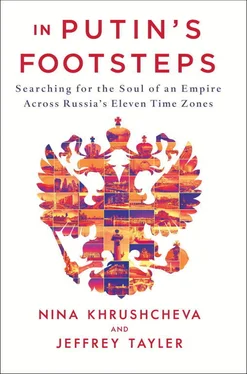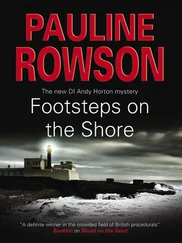All that uplifting travel—Russia was starving for the Kremlin’s attention—connected Putin to ordinary people and gave him the idea of delivering a rousing New Year’s Eve televised address to the nation. Standing before the Kremlin’s Spassky Tower, just before the giant bells rang in the year 2001, under starry winter skies in front of a large, snow-dusted Christmas tree, he pledged to counter the negativity of the post-Soviet decade and set the country on a new, positive course.
This he did. In his address, the ardent young leader looked both charming and in charge when he spoke of Russia’s great future, heroic past, and enduring spirit.
Putin had often appeared a reserved technocrat, but soon he would demonstrate a talent for finding opportunities to impress the heartland. He knew the best way to get to people’s hearts: showing them that his priority was returning Russia to the world stage as a major power of formidable dimensions.
Originally, he had an even bolder plan for his New Year’s address, and he had run it by journalists in his press pool during one of his trips around Russia. Without a hint of doubt in his voice, Putin told them that “Russia is an enormous country, a great country. We need to remember that our strength is our size. What if I were to travel through Russia’s limitless land in one night, through all its eleven time zones, stopping in each one at midnight local time to record the New Year’s message to show our nation’s greatness, our riches, the diversity of our Mother Russia, our unity, our worth?” [1] Igor Zotov, then editor at Nezavisimaya Gazeta (Independent Newspaper), in conversation with the authors, August 2016.
Even though Russia’s time zones are exaggerated in number (there should only be seven, according to generally accepted geographic markers of Greenwich Mean Time’s [GMT] twenty-four-hour cycle, also called Coordinated Universal Time and abbreviated as UTC), maintaining them is not only a political matter; it is reflective of the national identity, state power, and international influence. Russia has eleven time zones, more than any other country, and that, as Russians would have it, bespeaks its status in a way no one can deny.
Often the time that appears on a nation’s iconic clock—Big Ben in the United Kingdom, for instance, or those daunting dials on the Spassky Tower, in Russia’s case—is a subtle way of representing where power lies. In Russia, every time zone is first referenced in relation to MSK, Moscow Standard Time, with UTC only following. Moreover, many countries don’t even adhere to the twenty-four-hour GMT-UTC’s neat meridians. China’s huge landmass should straddle five different time zones, yet operates according to just one. Inhabitants of western China, if they follow their clocks, have dark mornings and light evenings, but nobody doubts that only the Beijing time matters. When Hugo Chávez became president of Venezuela in 1999, he decided to create a new time zone that would set Venezuela thirty minutes apart from neighboring countries. That was his way to let the world know that Venezuela was striking out on its own.
But Putin’s idea of showcasing his country’s temporal and geographic diversity in just one night was certainly unique, and it accorded with his plans to return Russia to its lost great-power status. It also sprung from what Putin knew Russians expect of their leader: something close to godlike status. Keen on creating a leader’s image steeped in tradition, history, and mythology often associated with the uniqueness of the “Russian soul”—spiritual endurance, persevering patience, belief in miracles, and material sacrifice—he wanted to be seen as the Ded Moroz (“Granddad Frost,” the Russian Santa Claus) bearing gifts of renewed national importance and self-confidence.
Capitalizing on Russia’s size—six thousand miles from east to west—Putin hoped to begin restoring his country’s grandeur, once czarist, then Soviet, and now Russian. The idea was bold and beautiful but, unfortunately, unrealizable. The young leader soon had to abandon his “across Russia in one night” plan, because covering eleven times zones in eleven hours, indeed, could only be done in a magic sleigh, not in an actual airplane.
Now, eighteen years later—it is worth recalling that he first became president when Bill Clinton sat in the White House—after last year comfortably securing his fourth presidential term with a formidable 77 percent public support, [2] “Russia Election: Vladimir Putin Wins by Big Margin,” BBC, March 19, 2018.
Putin is even more determined to present Russia as a formidable nation. In his 2017 New Year’s Address, he promised to bring all of Russia to the world stage, asserting that his country has finally “risen off its knees” and has truly become “vast, unique, and wonderful.” [3] “Novogodnee Obrashchenie Prezidenta Rossii” [New Year’s Address of the President of Russia], Channel 1, December 31, 2016.
He remains firm in his conviction that his country’s geographic dimensions play a vital role in projecting power, which he has done, lately, in close-by Ukraine and as far afield as Syria.
For the past few years the world’s eyes have set on Russia, with the same intensity as they did during the 1962 Cuban Missile Crisis with Soviet premier Nikita Khrushchev, or the 1991 collapse of the Soviet Union following Mikhail Gorbachev’s Perestroika. The reasons have been manifold: Russia’s 2014 annexation of Crimea and the consequent Kremlin-supported secession from Ukraine of the Donetsk and Luhansk People’s Republics; the alleged Russian meddling in the 2016 U.S. presidential elections; the European and American diplomatic crisis in 2018, after former GRU spy Sergei Skripal and his daughter were said to be poisoned in the United Kingdom with the nerve agent Novichok.
Putin has taken a tough stance in responding to these occurrences and allegations. He has been driving both the events and the rhetoric around them in Russia and across the globe. The very picture of a statesman, he has offered the West partnership around the world’s hot spots, be they Syria or North Korea. The more the West chastises Russia for its rogue behavior, though, the more combative Putin’s rhetoric has become.
As have so many in many countries, we, too, wanted to know how Putin’s idea of restoring pride to his once powerful nation has been playing out across its vast expanses. The great-granddaughter of Premier Khrushchev, Nina Khrushcheva, now a New Yorker, was brought up in elite circles in Moscow and is eager to see and understand her native Russia beyond the capital’s bounds. Jeffrey Tayler, living in Moscow and married to a Russian woman, Tatyana, felt the same way, his last trans-Russia journey having taken place in 1993.
Both of us wondered if the Kremlin had really managed to impose its writ on a hinterland traditionally impervious to change, but nevertheless having undergone three dramatic political and social upheavals in the past century alone. Determined to find out, in the spring and summer of 2017 we did something close to the sequential trans-Russia journey from which Putin found he had to desist. We followed, though in the warmer, more comfortable months, in what would have been his footsteps, visiting all of Russia’s eleven time zones in search of the factors—among them, natural resources, educational institutions, ethnic and religious diversity, and strategic assets—that define Russia and its place in the world. Do they, in fact, make the country an “indispensable nation,” to borrow a phrase former Secretary of State Madeleine Albright used to describe the United States? And it was not just in Putin’s footsteps we traveled; we followed the historical footprints of other Kremlin leaders, who, too, left lasting imprints on this giant land and on the people.
Читать дальше












